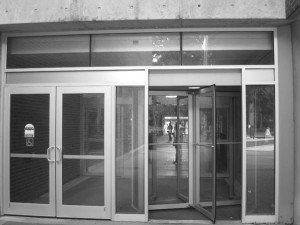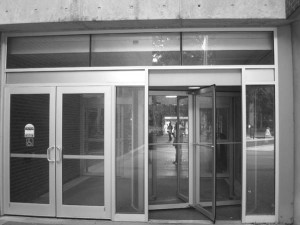by Jillian Stark

Although it seems like our campus just likes the look of orange net fencing and the sound of jackhammers in the morning, believe it or not, some of the never-ending campus construction at the College has a purpose.
In particular, the revolving doors that replaced the swinging doors in the Brower Student Center (BSC) last year were, in fact, installed with good intentions.
What could these intentions be? To consult a bit of science, air flows in and out of a building because of differences in air pressure.
In the winter, heated air rises to the top of a building, and — as long as there are any openings on the ground floor — cold air rushes in to replace it.
The opposite happens in the summer, when cold air flows out of buildings. The BSC, with its large size and high ceilinged interior, requires a lot of energy to regulate temperature in the first place, without mention of the constant flow of people coming in and out of the doors.
So, how are revolving doors helping? Well, its as simple as it sounds — they keep the good air in and the bad air out.
Believe it or not, if everyone used the revolving doors instead of the swinging ones, we as a campus could save tens of thousands kilowatt-hours of energy.
Aside from saving the College, and ideally us students, money in energy costs, tons of emissions would be cut off from our campus carbon footprint.
However, so many students choose not to use the revolving doors, which reduces the effectiveness of this effort.
Of course, other options have to be given for wheelchair accessibility, hence why we still have the swinging automatic doors as well.

Nevertheless, unless you really can’t handle the three seconds of claustrophobia that going through a revolving door requires, use them.
It’s probably the quietest moment you’ll have all day — unless someone comes in the same door as you, and then it’s probably the most awkward.
Moving away from the BSC, the handicapped doors of the New Library and the academic buildings are other sources of energy waste. While they might be labeled “low energy,” they could easily be converted into “no energy” with a simple reach and a pull.
Although we might not have the power to force our campus to switch over to renewable energy sources or to get every single person to recycle, we as individuals can make simple eco-friendly choices every day.
If you care about the environment, then you will have no trouble practicing these habits. If you could care less about the environment, then just use the doors anyway — it takes a minimal amount of effort to conserve energy.
Before you reach out to tap that little blue square to open the handicapped door, heavy as that door ahead looks, take a minute to think about your options. Who knows, you just might find that you enter buildings with more self-satisfaction than ever before.






